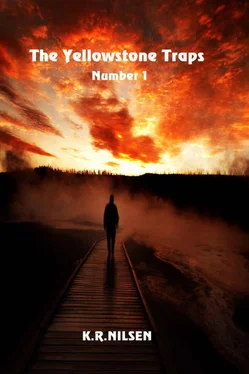“I would like nothing more.”
The women rose from the table. Penny pulled Winnie to her breast and gave her a heartfelt embrace.
“See you in an hour,” said the senior as she reached for the exterior door of Rough Diamond cabin. “It will be good for the both of us to do some honest work in the kitchen.” Penny snapped the door latch and stepped out into the cold. “You know that young man who was killed in the shootings, the young father?”
“No, I’m sorry I didn’t know him.”
“He was my son.”
The door closed and Penny hustled away.
Atrain of grain hopper cars approached the grade crossing west of Sweetly and stopped before the lead car struck Harland’s Farmall tractor. Human figures, tiny in the distance and far below the headhouse where Harland and Percy Bliss perched, formed a small knot between the train and the blockade of tractors.
As the figures huddled, Harland noticed something curious about the train.
“Say Percy,” Harland said, elbowing his friend to get his attention. “You see that second car in the train there?”
“Yeah.”
“What do you think that is?”
“I don’t know. Some sort of work unit.”
“No, look closely at that thing.”
Percy studied the metal creation for a minute, and scratched his head, bewildered.
“You know, Harland, that looks like it has all kinds of steel plating welded to it.”
“That’s what I was thinking. It looks like it has armor bolted on.”
“Could be. What’s it mean, you think?”
“It has to be protecting something.”
“Is it a troop carrier?” Percy ventured a guess.
“Mmm, could be. I don’t see any activity, though. Maybe it’s just there so those equipment operators have a place to sleep and get something to eat.”
“Yeah, that makes sense.”
A single individual broke away from the human cluster and moved up the lane to the grain coop. As he went, he waved at the heavy equipment operators and pointed to the tractors on the rails. The character made the turn up the ash-filled access to the coop. Behind the man, big bucket loaders roared to life and descended on the line of tractors. Buckets down, the loaders engaged one tractor after another and nudged them off the tracks.
Coop manager Jim Bottomly felt light-headed and could not catch sufficient breath as a man in military fatigues drifted up the drive and entered the lot before the coop office. Bottomly stepped ahead to meet him. He could see the fellow was an officer in the Guard, a fellow with a cement-block build topped with short bristles of red hair. He appeared very businesslike. The man confronted Bottomly and leveled a salvo of words at the manager.
“I’m Captain Ernest Hampstead, National Guard unit commander, Sioux Falls.”
Bottomly uttered a word, but he was cut off abruptly.
“You are to disperse these people now. My orders state that we are to load the grain from this facility onto that train. We will do that. If there is resistance, we will take any and all necessary steps to put down the resistance.”
Fright manhandled the coop manager. He could reach nowhere within his soul to find the fortitude to blunt the officer’s words. In the blindness of panic, he blurted, “Captain, these people haven’t anything to eat, for God’s sake. You can’t just take their grain.”
The officer looked over the small crowd and turned his attention to the farmers arrayed before the coop office. He chose his words carefully in an attempt to disarm the armed protesters confronting him.
“We are opening this line from Sioux Falls. We will move you there, then evacuate you to the east where conditions are far better. All the towns along the route are to be evacuated, per federal order. The terrible conditions you have been facing these past months are about to come to an end. You will be able to get plentiful food and supplies once we see you out to a safe and secure location.”
The officer turned to Bottomly once again. In quiet tones, the man issued an ultimatum. “Sir, we are here to do a job. We are going to do it. If there is any resistance whatsoever, it will be meet with overwhelming force. You have one hour to clear this lot. In one hour that train moves into place under these towers. Let me make one thing perfectly clear. At Brookings, we had to resort to deadly force. We are prepared to do that here if necessary. Do you understand what I’m saying to you?”
From their perch high in the headhouse, Harland and Percy watched as the lone figure turned away from the milling farmers below. The people remaining in the lot swarmed together around Bottomly for some sort of discussion. To Harland’s horror, the group below began to break up and drift away from the coop complex. They weren’t going to stand their ground even for a few minutes.
Anger swelled in Harland’s chest. Raising a clenched hand, he slammed it into the corrugated steel shell of the headhouse, cutting away the skin above the knuckles. Bleeding, Harland stalked down through the headhouse in an effort to dump the rage that had swept over him.
As his feet slammed along the gangway floor, he heard the man-lift motor whir to life. He clambered over to the shaft and peered down. Someone was coming up. After a minute, Jim Bottomly stepped out onto the headhouse floor. The lift did not stop. Others were coming up the shaft, too.
“What’s going on, Jim?” Harland growled at his old friend.
“They’re coming, farmer. They’re armed to the teeth, the commander says. They’re going to carry out their orders one way or the other.”
“We’ll see about that,” Harland bristled.
“Before the officer left, he told me that, at Brookings, they had been met with resistance from the local folks. They learned something from the hostilities, I guess. They used force, big force, to put the locals down. He also told us all that there’s an evacuation order out for all South Dakota border towns.”
“Evacuation? Do you believe that nonsense?”
“I don’t know what to believe, Harland. I’m just telling you what the man told me.”
As the coop manager and Harland exchanged words, four others, including two women, scrambled out onto the headhouse floor. All shouldered arms and toted small boxes of ammunition stuffed into their garments. The new arrivals pressed close to listen to the conversation. Harland switched into command mode now that he had an audience.
“Okay, the plan wasn’t to confront them directly. I thought everyone would put up a front for a while. That’s over. But the plan is still intact. From here we can control what happens on the tracks down below and to the grain in these bins. If we have to fire on them to chase the crews from the tracks, we’ll get return fire, says Jim. Stay away from the steel walls. They’re not thick enough to stop anything. Get down on the floor. There’s heavy reinforced concrete in the elevator towers, and that should stop just about anything from reaching us. If they send up tear gas, it would be pretty tough to get it in here. But if they do, just run all the way down to the headhouse end down there and wait until the air clears on this side.”
For an hour, the little resistance force in the headhouse peered out the east end window to watch the proceedings below. A throaty rumble from a diesel locomotive some distance away reached the headhouse and the farmers watched as the train inched its way toward the elevator silos. Several figures below walked ahead of the train, as if inspecting the track. In short order, they came upon the gap in the rails and flagged the train to a stop.
In the old rail car behind the flatcar, a door opened in the side of the body and figures disgorged, nearly a dozen of them, hands laden with goods.
Читать дальше










